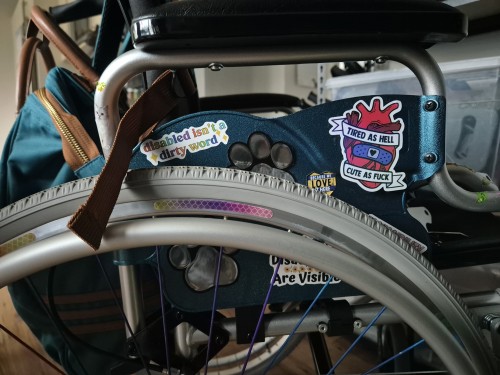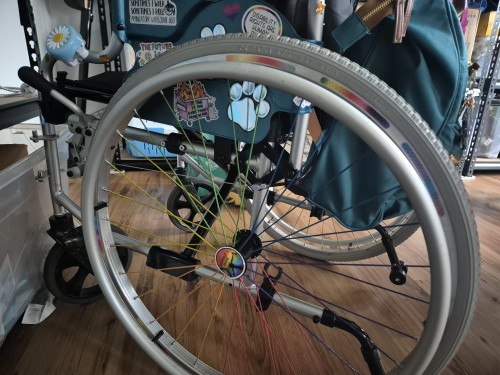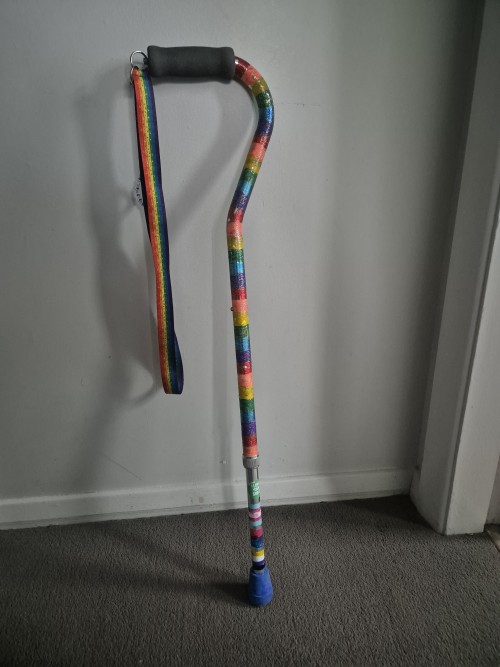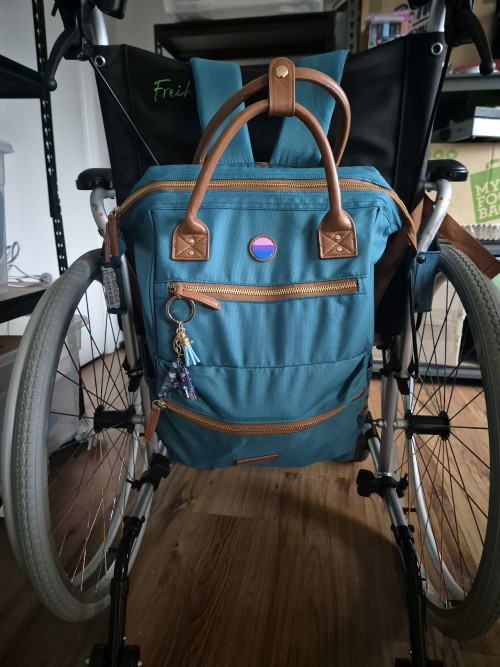
No, there are not 69 of us but we are hiding in a trenchcoat.. medically recognised adult DID system studying to become a clinical psych. We are aware we make mistakes, we know we make mistakes, we're open to kind discussion!!!! 🇳🇿🏳️🌈🏳️⚧️ Please remember, there is a person behind almost every post on the internet, including syscourse. Be kind.
1611 posts
Disabled System Asks: 1-4, 10!
disabled system asks: 1-4, 10!
1. Is your disability invisible, visible or both?
Both: invisible in the way that there appears to be nothing outwardly wrong with us (as doctors kindly keep reminding me) but visible in the way that we use mobility aids almost all the time. We wear a sunflower lanyard in public, and use a mixture of a cane, crutches and a wheelchair depending on the day.
I wish to add, as someone who has looked able bodied, and disabled in various fonts.. people don’t treat disabled people better if they’re in a wheelchair or visibly ill, and some are arguably worse to young wheelchair users.
2. Do you use mobility aids? If so, what for?
We do! As said above. We have a mixture of issues (ranging from endometriosis to POTS to hEDS to fibromyalgia) that create.. well, a mixture of issues XD. We’ll use the wheelchair on bad pain and fatigue days and carry the crutches.. or, on better days, just use the crutches to take some pressure off our knees, and aid as balance. As cool as our cane looks (photos later), we stopped using it as it was giving us pretty severe hip pain on one side from the way we had to lean to get support from it (still my fav visually though).
3. Is there a specific alter/part/headmate who fronts to deal with pain? How do they manage it?
Yes, that would be me. I split when we were very young to deal with injury, particularly blood. As our chronic pain increased, so did the amount of time I spent fronting, until I slowly became our most common fronter. Sucks though, cuz that was never meant to be my job, I was supposed to stay sitting on the sidelines only appearing to deal with first aid and other protector things. Instead, I’m here, and somehow I make it everyone else’s problem.
My appearance as most common fronter got us outed as a system because I’m so drastically different from the common fronters of the time. {its a little more complicated than that but you get the idea}
I manage it with a combo of pain killers (including medicinal CBD, THC, and flower, pregabalin, panadol, ibuprofen, codeine and morphine amongst other things… happy to answer questions about any of them if you’re curious), dissociation, weaponised tears and sheer fucking willpower… I wish I could say sheer fucking will was still working, but it is not very well anymore. There’s only so much one can deal with, and our pain has been getting steadily worse for the past few years with very little support (most of our illnesses have no cure, only management). We’ve reached the point where our doctors and specialists aren’t sure what to do with us and are wondering if there’s something they have missed…but uh, our tests, bloods and results are coming back clean. Looking into that at the moment lol.
4. Do you experience pain variety based on who’s fronting?
Oh hell, do we ever. Certain members of the system *cough* Kyle *cough* have dreadful pain tolerances - I always know when one of them is cocon because our pain skyrockets into impossible levels, even if I’m trying to keep it under control. Certain other members of our sys have average pain tolerances, some age regress to cope, others just curl up in a ball and sob.. depends on the alter - and the cyclical nature of parts of our pain make it difficult to manage, and to recognise how each alter is affected. Plus, it’s hard to compare pain tolerances when each of us have no other/barely any frame of reference.
10. Do you decorate your aids?
YES. We use a combination of spray paint, cheap nail polish, stickers and in the case of the wheelchair, holders designed for prams and bikes (water bottle holder, clips, bells, reflective stripes etc).. aids start out super boring and for us, decorating them and making them prettier is the only way to make them tolerable. And political - if the government is going to make our life into a political ‘issue’, we will turn right back around and make them aware of our existence ;)
the pic doesn’t grasp it very well, but we painted the chair’s spokes rainbow (and they look super cool when we’re driving it)
Thanks to @disabled-systems for the game <33




-
 thegayquail liked this · 6 months ago
thegayquail liked this · 6 months ago -
 polteergeistt liked this · 6 months ago
polteergeistt liked this · 6 months ago -
 the-rat-hive-collective liked this · 6 months ago
the-rat-hive-collective liked this · 6 months ago -
 mimocrocodilelol liked this · 6 months ago
mimocrocodilelol liked this · 6 months ago -
 endersdead liked this · 6 months ago
endersdead liked this · 6 months ago
More Posts from 69constellationsinatrenchcoat
I have got to stop messaging people's ask boxes saying I like their username.. ppl are gonna start thinking I'm weird /j
HIT US wITH 'EM. GO ON.
We like answering questions.
🩼🦼 DISABLED SYSTEMS ASK GAME!🦽🦯
1. Is your disability visible, invisible, or both?
2. Do you use any mobility aids? If so, what for?
3. Is there a specific alter/part/headmate that deals with pain? How do they manage it?
4. Do you experience pain variety based on who’s fronting?
5. How has your disability affected you negatively? (As a system or in general)
6. Has your disability affected you positively? (As a system or in general)
7. How can people best accommodate you IRL?
8. How can people best accommodate you online?
9. What do you do to manage your pain/any advice?
10. Do you decorate your aids? (Show us if youre comfortable!)
11. Who supports you the most out-sys?
12. Fun fact about yourself?
13. Hobbies? How does your system and/or disability affect your hobbies?
14. Funny story related to being a disabled system?
15. Free question! Tell us/say/do whatever you want!
How to use this format under break!
Step 1: Reblog to your blog!
Step 2: Let your followers send in the corresponding numbers of the questions they want answered!
Step 3: Wait and answer!
everyone claims to be an ally to the disabled community until
- it’s a high support needs autistic
- the symptoms can’t be romanticized and are gross
- someone else’s disability starts to affect their life
- it’s a condition that cannot be cured
- someone is intellectually disabled
- someone is female and disabled
- someone is queer and disabled or black/POC and disabled
- someone is a minor and disabled
- ambulatory wheelchair users exist
- part time mobility aid users exist
- the “hellen keller wasn’t real” discussion
- they’re called out on their ableism
- someone is semiverbal/nonverbal
- someone doesn’t understand boundaries or the law
- someone has a deaf accent
- someone misses a lot of school or doesn’t go to school
- someone doesn’t want their disease/disorder cured
- someone does want their disease/disorder cured
- age regression
- having to mask for someone’s genuine safety
- actually needing to listen to disabled people’s opinions instead of immediately forming their own
- not infantilizing disabled people
- when a disabled person struggles with hygiene
- they see a “useless” disability aid
- they don’t agree with a disabled persons lifestyle or opinions
- until they have to put in work to be an advocate and a real ally to the disabled community.
everyone is a disability ally until things get hard.
First thing - common misconception: you don't go through the five stages of grief in any kind of order at all (quick reference).
The person who coined the terms, Elisabeth Kübler-Ross, talks about this in the original material that uses the terms.. however, pop culture did as pop culture does and messed with the public's perception making it seem like they're a tick list. Singlets don't go through the stages of grief in the commonly taught order, and it's very common to jump around between them.. even minute by minute. Especially if you had a complicated relationship with the person!
However, adding a system into the mix complicates things further
Some systems will split an alter/part to deal with the grief
Grief can be challenging due to the dissociative nature of DID. Alters may have varying levels of memory about the loss or may experience the grief at different times. This can lead to a fragmented or inconsistent emotional experience.
Different identities might process grief in different ways. Some may have more difficulty acknowledging or expressing grief, while others may be more in touch with these feelings.
DID systems may develop unique coping mechanisms that involve different alters working together to manage grief. This might include rituals, writing, or talking with therapists or support networks.
So yeah, DID complicates it a lot
OP your experience sounds pretty spot on to what I've heard from other systems and what we've experienced ourselves. Sending love <3
(Just ps. We still have alters who don't know certain members of our family died..and all of them passed 5-10 years ago 🥴)
No one talks about grieving with D.I.D, and how badily it affects your entire system. Like people without D.I.D keep telling us that we are going through the five stages of grief etc and that you go through them in order, but for us it feels like its something that constantly restarts itself and loops due to switches.
Like no matter how much we think that we are finnaly at the acceptance stage it feels like we go right back to denial again.
I am NOT saying feeling this way automatically equals having D.I.D, but us feeling this way is most likely because of that.
Can anyone else relate??
GOOD POST. LONG POST BUT GOOD POST.
This book- The Haunted Self is available online as a pdf if you know where to look :)
Why Alters Are All You, & The Formation Of DID
Tw for talk of abuse (implications to different types), trauma, unsafe caregivers, trauma responses, homophobia, and brief talk of death. We're talking about the formation of DID, childhood trauma, please be cautious if you continue.
Let's discuss what people say is the basics of Dissociative Identity Disorder, its formation. The current leading theory is the Theory of Structural Dissociation (ToSD). Yes, we still need to know more about this disorder, but this is the current leading theory and was written by Ellert R. Nijenhuis, Kathy Steele, and Onno Van Der Hart. They took some research, ideas, and words from other authors and researchers, added their research and ideas, mixed it all together and presented us with the ToSD in their book: The Haunted Self.
Now, there are plenty of problems with the theory, and I know that Hart and other researchers you see in this field haven't been the best people. However, it is currently the leading theory. Colin A Ross spoke about numerous problems with the theory, but he even states that this theory is a significant contribution. While yes, it isn't perfect, and any scientific theory can and should be constantly improved on, its pretty damn good. What I understood from reading Ross' response, the understanding it gives us of DID is good, the issue is when it addresses other disorders, or lack there of. I will state, before going onto my point of the post, that Ross mentions that there is confusion of what counts as an emotional part (EP). In the sense of, how differentiated does an EP need to be, to count as a separate dissociated state?
I don't want to go into that all today, because I'm not a professional and cannot confirm what would count, at least in Ross' eyes.
What I want to talk about, is what the ToSD does give us, and why it explains that all parts/alters are You.
Now, I know I will get a lot of hate for this. So all I'll say is that: I'm willing to discuss this matter further, however I will not tolerate any insults, threats, belittlement, or any other kinds of hate. If you are mature, I'm open to discussion.
The ToSD states that everyone is born with ego states. These states are in charge of meeting specific needs. A child needs love, affection, food, comfort, sleep, etc etc. If a child is able to dissociate to a high level, has a disorganised attachment to their primary caregiver (which is inherently traumatic), and experiences repeated childhood trauma, they can potentially develop DID.
If a child experiences trauma, their brain is going to do its absolute best to protect them. They may fight, flight, or freeze (especially if it is repeated). Maybe all three. That child may subconsciously think that if they were a different gender, or a different age, or maybe if they were stronger or scarier, they could prevent this from happening to them. Maybe they felt like they deserved this pain, that they're an awful monster, or just a toy or an animal to their abusers. Maybe they just refused to accept this was happening to them because if it did, they would be dead.
Their brain will do anything it can to try and prevent and explain this trauma.
They may try to seek help from caregivers, but remember, in the case of DID, that child will have some kind of disorganised attachment. That child will not feel safe enough to tell them about this trauma, or if they do, they aren't supported in the way they need to heal and process. Maybe their caregivers are the source of this trauma, they have already tried to tell them to stop.
Nothing is working, this child is essentially trapped.
So, like I said earlier, this child's subconscious is working on overdrive and trying its absolute best to survive this. Dissociation is a very complex and extraordinary coping mechanism.
So the child pushes away the trauma, dissociating so chronically they disconnect to everything happening, and themselves. This dissociation is keeping those different ego states separated, preventing from them integrating during childhood. Instead, this dissociation basically creates amnesiac barries between each ego state. If that dissociation wasn't there, those states would try to integrate, but because some experienced trauma, they cannot harmoniously coexist. This is the differentiation between ANP's and EP's. ANP's (apparently normal parts) are the parts that are in charge of daily living, they are disconnected from any trauma. EP's (emotional parts) are the parts that remember or are connected to different traumas. EP's dont have to be emotional, it simply is to refer to the parts that are connected to trauma.
Anyway, mini ramble aside. ANP's and EP's are separated from each other, they still are aiming to meet certain needs for the child/person now. That's why it is so helpful or common for systems to catagorise alters into roles. Some parts are simply trauma responses, some exist to make friendships and connections, some have very specific roles/needs they meet, some alters exist to soothe, or protect, or whatever. They are still dissociated parts, aiming to meet needs.
All alters are still dissociated from each other, and some may believe they are the only one there, or the "original" because they are an ANP or host. Again there is not an "original" because the full personality was never whole to begin with. You started with different ego states, and you still are different ego states (obviously alters have grown and developed (but still not fully)).
So with that being understood, lets address the title of this post. All alters are You. Thinking about everything I have addressed for far, all alters are dissociated from each other, so what do you mean there can be a "You"? Again, I'm not talking about an "original", I'm talking about all aspects of the Self that is being dissociated from.
I used to find this fact absolutely ridiculous and hurtful and dismissing. But after starting to learn more about this disorder, working on self validation, and starting on trauma processing, it has made it so much easier to understand.
I, Virgil, am a part of Clem and Skye. Clem and Skye are parts of me. And this is the same for all alters. We are all different ego states that are dissociated from each other, from the Self.
So, what happens if we all fuse? And no, I'm not saying that's the only way to heal, I'm just trying to put this in perspective. If we all fuse, we would be dissociating so much less, we would be fused ego states and we'd create a fully formed and developed personality. We are all parts, and if we fuse, we create a whole.
A whole that we are no longer dissociating from. We will be the whole Self, the whole "You". We will not be dissociating from each other.
I cannot express this enough, fusions happen when you no longer need alters to be separated, they can exist harmoniously, they share emotions and thoughts and feelings and they are not dissociated from each other. There is no memory amnesia, or identity amnesia between them.
Again to clarify, all alters are dissociated ego states that grow and develop, and then if you all fuse, that is when the Self is no longer dissociated from. You'll finally be a complete You.
Another thing I want to address is differing opinions of alters. Let's use another hypothetical. Let's say you have like five different alters that are all queer in some way, but you have five that are cisgender and straight. Two of those cishet alters are homophobic and transphobic. So, if you all fuse, what will you identify as? While I cannot say anything for certain, I can take a big guess and say that no matter what you identify as, you may not be homophobic/transphobic. In this hypothetical, I'm assuming those alters have those beliefs because of things they experienced growing up. Internalised homophobia and all that. As you process trauma and become more accepting of yourself, and you fuse, I would guess those parts are no longer dissociated from that queer identity, whatever that identity may be.
I hope this makes sense. While alters can and do grow outside of trauma, those foundations are shaped because of the experiences of the child. Age, gender, opinions, personality, species, and even sexuality, can all be based and rooted in that trauma and experiences.
Healing from that trauma means reconnecting with the Self, whatever that looks like for you. It may not be the singlet persona many systems use, it may not be the host, it may be something different than what you originally thought. But it will be You and it will be right. It will be the Self that you've finally reconnected with.
Anyway, I think I've rambled enough. TLDR: all alters are You, and if you fuse, you will reconnect with the Self that was originally being dissociated from.
small edit: it is okay if you aren’t ready to accept alters and trauma. but that doesn't change the fact that you're all dissociated parts ✌️